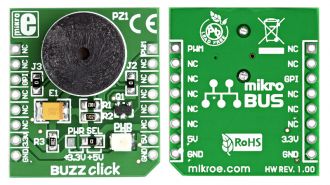
We strongly encourage users to use Package manager for sharing their code on Libstock website, because it boosts your efficiency and leaves the end user with no room for error. [more info]

Rating:
Author: MIKROE
Last Updated: 2019-03-11
Package Version: 1.0.0.1
mikroSDK Library: 1.0.0.0
Category: Speakers
Downloaded: 10228 times
Followed by: 3 users
License: MIT license
A simple example which demonstrates working withBUZZ click board in mikroBUS form factor.
Do you want to subscribe in order to receive notifications regarding "BUZZ click" changes.
Do you want to unsubscribe in order to stop receiving notifications regarding "BUZZ click" changes.
Do you want to report abuse regarding "BUZZ click".

Library Description
The library covers all the necessary functions to control BUZZ Click board.
Library performs the communication with the device via PWM module and using Sound library.
Key functions:
Examples description
The application is composed of the three sections
The application is composed of three sections:
void applicationTask()
{
mikrobus_logWrite( " Play the music ", _LOG_LINE );
buzz_melody();
Delay_ms( 1000 );
mikrobus_logWrite( "----------------", _LOG_LINE );
}
Additional Functions :
Other mikroE Libraries used in the example:
SoundUARTAdditional notes and informations
Depending on the development board you are using, you may need USB UART click, USB UART 2 click or RS232 click to connect to your PC, for development systems with no UART to USB interface available on the board. The terminal available in all MikroElektronika compilers, or any other terminal application of your choice, can be used to read the message